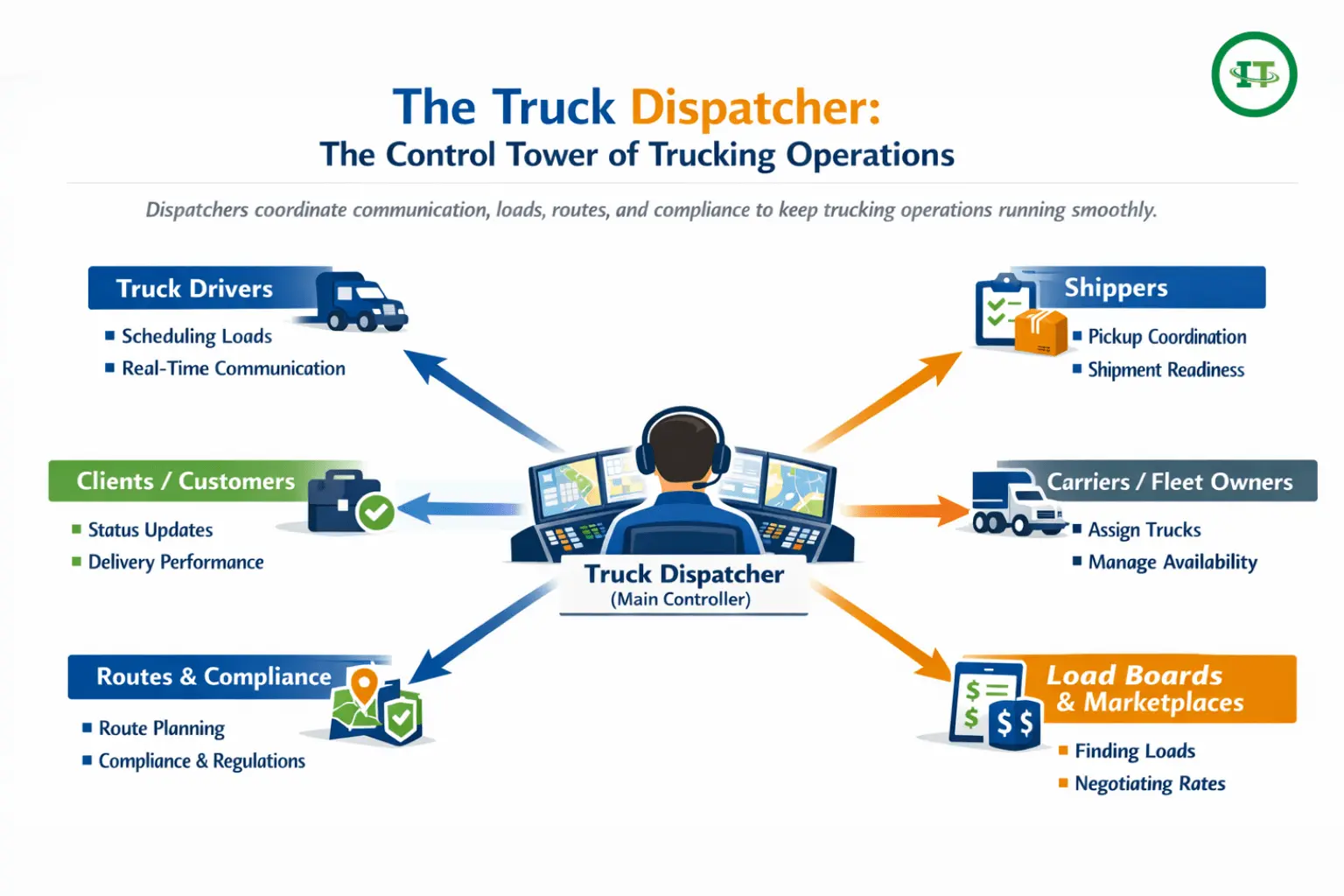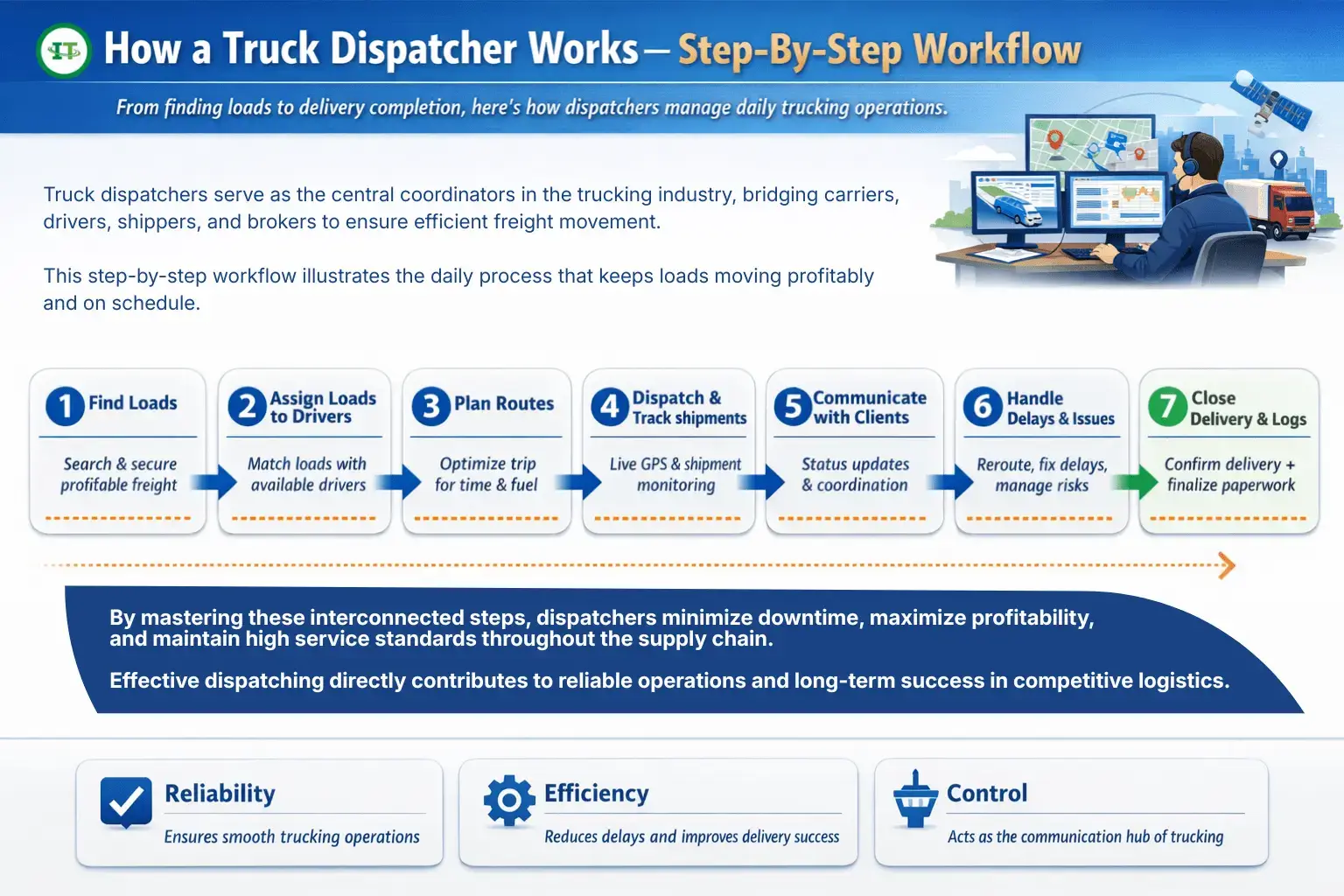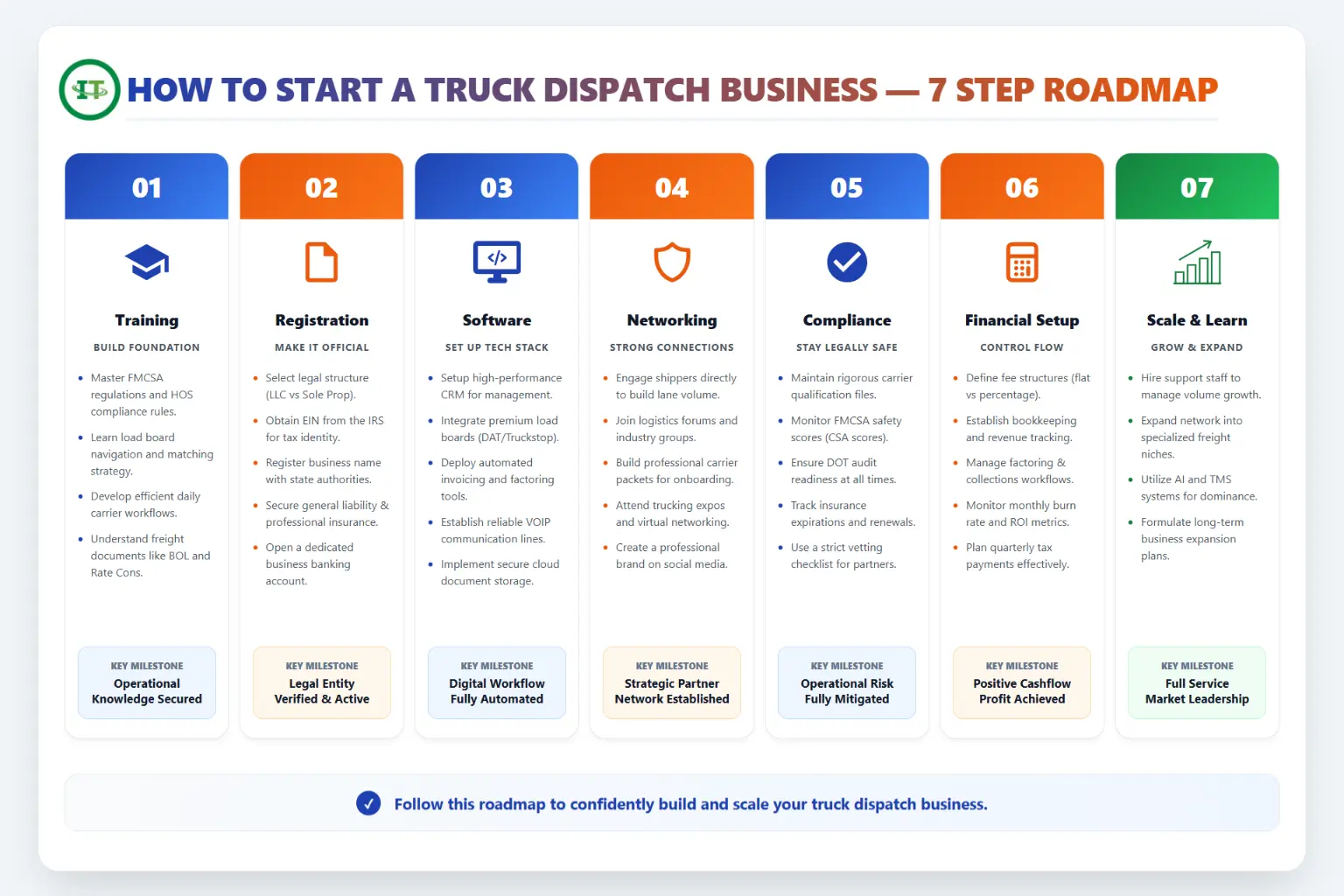How To Become A Truck Dispatcher?

Behind every on-time delivery is a smart dispatcher turning coordination, communication, and consistency into success.
Learn how to become a truck dispatcher and keep the wheels of logistics rolling successfully!
Behind every successful delivery is a dispatcher who never gives up despite obstacles. These are all go-getters with basic knowledge of logistics. If you dream of being your boss by starting a truck dispatching business or adopting this as a profession, here’s a complete guide for you!
A truck dispatcher’s business is all about coordinating and managing the schedules of goods. Truck dispatchers liaise between truck drivers, logistics providers, and clients to ensure efficient and timely deliveries. They also strategize routes and monitor goods in transit and shipments.

What Will We Cover?
- What Does A Truck Dispatcher Do In the Trucking Business?
- 7 Core Responsibilities And Tasks Of A Truck Dispatcher
- Truck Dispatcher Vs. Freight Forwarder
- What Qualifications Do You Need To Become A Truck Dispatcher?
- Learning & Growth Resources, Tips, And Options
- Earning Potential & Average Truck Dispatcher Salary
- How to Start A Trucking Dispatch Business? Described in 7 Simple Steps
What Does A Truck Dispatcher Do In the Trucking Business?
The truck dispatcher has several responsibilities. Before knowing how to become a truck dispatcher, you must know what they do. They find loads, assign them to the truck drivers, track shipments, communicate with clients, and ensure that the fleet follows regulatory compliance and runs smoothly without issues.
They also manage route delays and reroute the fleet in case of traffic congestion, bad weather, or other issues.

7 Core Responsibilities And Tasks Of A Truck Dispatcher
Explained here are the core responsibilities and tasks of truck dispatchers.
1. Coordinating Freight Pickups and Deliveries
They schedule the freight and organize pick-ups and on-time deliveries to maintain operations seamlessly. They coordinate between the shippers and carriers to meet their customers’ expectations.
2. Close Communication With Drivers
They communicate regularly with the drivers to address their concerns and coordinate with the fleet. They are the primary point of contact for solving any problems in real-time.
3. Coordinating Link Between Drivers
Regularly communicate with drivers to provide updates, address concerns, and ensure smooth fleet coordination. Serve as the primary point of contact for real-time problem-solving.
4. Route Planning
They develop routes to save fuel, reduce transit times, and reduce operational costs. They also use technology and mapping tools to find the best pathways.
5. Managing Schedules and Load Boards
Truck dispatchers assign freight and keep track of load boards. They also ensure that all the sources are used optimally.
6. Handling Driver Reports and Logs
One of the truck dispatchers’ prime responsibilities is overseeing trip reports and driver logs. This ensures that mandatory regulatory standards are met.
7. Resolving Transportation-Related Issues
They resolve and address any challenges related to route changes, mechanical breakdowns, delays, and other issues. They also mediate between the drivers and clients.
In addition to the above duties, truck dispatchers ensure that the fleet adheres to the latest FMCSA guidelines and complies with national laws to ensure its safety.
Truck Dispatcher Vs. Freight Forwarder
Truck dispatchers and freight forwarders have entirely different roles in the logistics world. Truck dispatchers manage day-to-day logistics and ensure that trucking operations move smoothly. They oversee whether drivers follow regulations, schedules, routes, etc.
In contrast, starting a freight forwarding business means dealing with carriers only. Freight forwarders are intermediaries who arrange goods for their clients, coordinate with them, consolidate their shipments, and handle the customs documentation process.

Here’s how the demand for truck dispatchers is going to increase in the coming years:
Did you know? The U.S Bureau of Labor Statistics (BLS) reports that transportation, storage, and distribution employment is expected to grow 9% from 2023 to 2033, faster than the average for all other occupations. [1]
Let us move toward another important section: the academic requirements, licenses, and certifications you need to start a freight forwarding business.
What Qualifications Do You Need To Become A Truck Dispatcher?
Do not worry if you are not highly qualified! You don’t need a college degree to become a successful dispatcher, but a high school diploma or GED (General Educational Development) is essential. However, you would need legal registration, training, and technical skills.
However, to start a truck dispatching business, you would need strong communication and coordination skills. Also, an aptitude for better organization is required. Many start-ups are working as truck dispatchers from their homes and earning well.
Basic Academic Requirements
To start a truck dispatcher business, you must have a high school diploma, GED, or equivalent. These are the minimum academic requirements.
However, it is not necessary to have post-secondary education in transportation, freight management, and logistics help.
These courses will help you with your journey
- Bachelor’s degree in logistics, transportation, and fleet management.
- Completion of truck dispatching diploma courses
- Another credential, like a diploma course in project management, helps too.
What Additional Skills Are Required?
- Strong communication skills and aptitude for negotiations
- Knowledge of technology (CRM, dispatch software, load boards etc.)
- Problem-solving and time management skills.
- Organizational skills
- Close attention to details.
- Round-the-clock customer service.
License And Certification Requirements To Become A Truck Dispatcher
There are a few licenses that are required to acquire before starting a truck dispatching business. Once you have acquired these, you’re good to go!
- Business License (which varies state by state)
- FMCSA (Federal Motor Carrier Registration) if you are the authority for dispatching)
- Optional Certifications like dispatcher training, freight brokering license, and more.
These are the desired qualifications needed to become a truck dispatcher. Here are the resources, tips, and options.
Learning & Growth Resources, Tips, And Options
To become a truck dispatcher, you must be prepared with quality training. Aspiring truck dispatchers can go in for online or one-to-one training courses.
Truck Dispatcher Courses Online Vs. One-on-One Training
You can opt for online or physical (One-on-One training) programs, depending on what suits you better. Here is the detailed comparison:
| Difference | Online Training | Private Training |
|---|---|---|
| Explanation | These flexible courses offer self-paced learning (videos, materials, and forums are examples). |
Direct interactions with the top-notch experienced dispatchers in person and with a customized curriculum. |
| Reliable Resources/Platforms | Brook Transportation, Apex Capital, Load Training, Udemy/Coursera, Freight Broker Boot Camp, and Load Training are credible platforms and resources. |
Customized community colleges, industry networking, specialized training consultants, and freelance dispatchers. |
| Duration | Six weeks to a few months |
Variable (few sessions to ongoing) 6 weeks to months. |
| Expected Outcomes | You will gain basic industry knowledge, knowledge of the dispatch process, familiarity with software, and basic regulatory compliance. |
In-depth and tailored understanding, hands-on practice, problem-solving skills, and faster learning. |
| Pros | Flexible, a wide range of options, no stress from physical classes, and affordable. |
Personalized and direct mentorship for better learning. |
| Cons | A high level of self-discipline is required as there is limited direct interaction and little networking. |
Only limited trainers are available, plus high-cost charges are attached to it. |
Software & Technical Skills You’ll Need To Master
To become a truck dispatcher, you must master these software and technical skills.
- Load Boards and freight management Truckstop.com, DAT
- Fleet Management Motive, Fleetio
- Accounting Tools Shoeboxed and QuickBooks
- Mapping Tools Tucker Path and Google Maps
- CRM & Communication HubSpot, Slack, Google WorkSpace
Apart from these software, you must learn how to use a good trucking dispatch system. CommuteLogix – trucking dispatch software is a highly recommended one to begin and outshine.
Why Do You Need Internship To Become A Truck Dispatcher?
An internship is always a good way to prepare and gain practical knowledge. Working as an assistant to an experienced dispatcher will help you be professional and knowledgeable. Interning in a good logistics company or as an entry-level logistics service provider will help you gain real-world knowledge.
Work Experience And Professional Growth
Gaining work experience matters as it helps you excel. You can handle a few trucks to a whole fleet or even start a truck dispatching business. The top keys to success are continuous learning, networking with industry experts, and embracing technology.
Always remember that experience makes you perfect, leading to a reputation that brings business. So, aim to gain experience.

Earning Potential & Average Truck Dispatcher Salary
Truck dispatchers have good earning potential. Depending on their setup, work experience, and clientele, they can earn between $40,000 and $75,000 yearly.
Salaries For In-House Dispatchers Vs. Independent Dispatchers
If you are qualified and experienced, you can earn reasonably well whether you start a dispatching company or work as an independent dispatcher.
On the one hand, in-house dispatchers can earn $18-$ 25 per hour, and independent dispatchers can earn $ 1,000-$ 5,000 or more per month per client.
Factors That Influence Dispatcher Income
Several factors influence the dispatcher’s income. Here are a few:
- How many trucks do they dispatch daily?
- Their freight niche (reefer, dry van, or anything else)
- Their ratings, reviews, and market reputation
- Their ability to scale
Your earnings largely depend on how much value you can provide to the carriers. Let us move on to quickly guide you on how to become a truck dispatcher.
How to Start A Trucking Dispatch Business? Described in 7 Simple Steps
Nothing is as good as starting a trucking dispatch business. You can have a good earning potential owing to its increasing market size. Here are the seven simple and easy steps:

#1 – Obtain The Required Training
Your training is the launchpad to success. You need to get the required training related to trucking dispatch. For instance, try to acquire these training and certifications to increase your market potential:
- FMCSA Regulations Understand the Federal Motor Carrier Safety Administration regulations relating to service hours/driver qualifications, safety compliance, etc.
- DOT Compliance Knowledge of the Department of Telecommunications and gaining knowledge peculiar to the industry.
- Specific Trucking Terminology The trucking industry has its language. You need to learn that terminology to excel for easy communication.
- Load Boards and Freight Matching Learn about load boards and freight matching with a reliable truck dispatcher.
#2 – Register Your Dispatch Business Legally
First, it is essential to choose a business structure. Decide what you want to start and feel comfortable with (LLC, sole proprietorship). Get the required licenses and training, and start your dispatch business easily.
Gaining the required licenses will help you be legally secure and build your credibility in the market. Also, being well-equipped with all the licenses will help you easily start a business or be a professional. So, acquire the required permits and get all the suitable training beforehand.
#3 – Invest in Essential Tools And Dispatch Software
There are specific software that are a must-have for you. Whether you want to be a truck dispatcher or want to start your business, these technologies help. Acquire DAT Load board, Trucking management software, a CRM, invoicing, and documentation tools. Also, accounting software is necessary.
For instance, a robust CRM streamlines coordination and communication with clients, truckers, etc. It is also an excellent follow-up tool, offering complete analytics and automation to scale your business and deliver exceptional service. Accounting software also helps you manage incomes, expenditures, and liabilities like taxes and scales with business growth.
Investing in these tools & technologies can help you be efficient and ease several business operations.
- Load boards
- Shoeboxed
- CRMs
- CommuteLogix (A complete trucking dispatch software that has been trusted to boost efficiency and productivity by several clients all across the globe.)
#4 – Building Networking With Shippers and Carriers
As in any other profession or business, networking is essential. To start a successful trucking business, you also need networking via LinkedIn, FB groups, or dispatch forums. You can also adopt strategies like cold calling and email marketing to get an edge.
Other proactive strategies, like attending industry events, forums, etc., can help you get an edge over others. Remember the golden rule: the more you connect and remain active, the more you grow and have market credibility. So, to build a business consistently, you need to focus on networking and keeping updated on market trends.
#5 – Understand Compliance and FMCSA Regulations
To run a successful dispatching business, you must understand and follow FMCSA (Federal Motor Carrier Safety Administration). These regulations help you know Hours of Service (HOS) and maintain proper documentation and safety ratings.
Understanding all the legal requirements before starting a truck dispatch business is necessary. You must also ensure that your carriers meet the licensing and insurance standards. Keep on updating FMCSA regulations as they are likely to change. Once you understand all the requirements, you can avoid penalties and build client trust.
#6 – Manage Finances And Dispatch-Related Expenses
If you can manage your finances well, you can have a key to long-term sustenance in this business. Budgeting tools, communication systems, and other overhead expenses must be considered.
To start a trucking dispatch business, you need accounting software like Xero and Quickbooks. You also need an invoicing tool to manage cash flow. A lot of dispatchers integrate accounting platforms and CRM for hassle-free data flow. You need to understand your profit margins, your expenditures, etc., to make a wiser decision that can kickstart your business.
#7 – Keep Learning And Scaling Your Dispatch Business
It is good to remember that in the ever-evolving world of the trucking industry, you need to stay updated. To perform better in the sector, you need to learn constantly and network simultaneously. Also, keeping clients as your priority, gathering their feedback, and providing them with valuable services will give you an edge.
Become a truck dispatcher first, gain experience, and gather resources. Once you have both, think of starting your own business. Hire an expert team, adopt all the latest technology to ease operations, and begin. Do not be too comfortable, as growth continually comes with adoption, learning, and networking.
Want to know what strategies you need to adopt? Let’s get to know the best practices.
Best Practices For Running A Trucking Dispatch Business
Here are the best practices to follow when starting a trucking dispatching business:
- Offer a transparent pricing policy and maintain good communication.
- Staying compliant with the latest state and federal regulations.
- Leveraging the latest software and automation technology.
- Track the market trends, technologies, and changes in rates.
- Build strong networking with the drivers and carriers.
- Handle all the paperwork and payments on time.
- Delivering efficiency and excellence.
Conclusion
Given that the truck dispatching industry is evolving rapidly, you can expect to earn well and grow. Whether you need a flexible work-from-home career or aim to build something profitable, like starting a truck dispatching business, you have unlimited growth potential. All you need is the proper training and technology.
TLDR – Key Takeaways
- A truck dispatcher manages and coordinates truck drivers, acting as a link between carriers and shippers.
- Freight forwarders differ from truck dispatchers as they manage only the carriers.
- To become a truck dispatcher, you typically need minimal academic qualifications, but you must have strong communication and coordination skills.
- The earning potential of the truck dispatcher varies and depends on various factors.
- Starting your dispatch business requires specific licenses, training, tools, and marketing.
- Continual learning and smart networking are the keys to success.
Get Your Queries Satisfied Here!
We’re always happy to help you anytime you need it! Let us know if you have any questions about how to become a truck dispatcher.
1. How do I become a truck dispatcher with no experience?
You can start by acquiring industry knowledge through an online training program or an internship, and then gradually build a network.
2. How much can you make by dispatching trucks?
The annual salary of truck dispatchers starts from $42,000. In-house dispatching business teams earn an average annual salary of $40,000 to $60,000.
3. How do I start my own trucking dispatch business?
To become a truck dispatcher or start your business, you need essential technologies and tools, in addition to the required licenses and qualifications. Then, you should start building your client base and networking.
4. What licenses are required to become a truck dispatcher?
To start your trucking business and operate as an authority yourself, you will need a business license and, sometimes, FMCSA registration.
5. How much capital is required to start a trucking dispatch company?
As a rough estimate, you’ll need between $1,500 and $3,000. However, the initial investment largely depends on your specific needs.
Get an Edge With iCommuneTech and Become A Truck Dispatcher Successfully!
iCommuneTech is the name to trust for the latest and most advanced Trucking Dispatch Software. When you need to manage the load, want to coordinate and communicate with drivers, or need help with regulatory compliance, our tool will do it all!
Get in touch with us and get your customized software today!
References
1. Bureau of Labor Statistics – (Source)
Irshad Pathan

Web Development Expert
Irshad is a senior technical expert at iCommuneTech. He manages the iCommuneTech's Web Development Team, and has hands-on expertise in web development, Laravel development, Logistics, fleet management, and Supply Chain Management. He mentors the in-house team and enjoys describing his experience in words.
Read More Insights By Irshad →